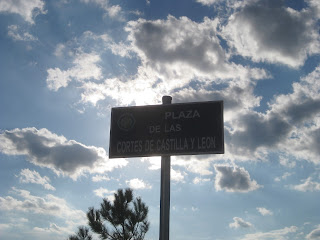It's starting to feel real.
I'm quickly approaching my last days here in Valladolid. As difficult of a relationship as I have with Pucela, leaving this town is bittersweet. Big upheavals in life are always difficult, and leaving the place where I've lived and loved and worked and bled for the past ten months won't be any exception.
There have definitely been cold nights and times where I wanted to feel something familiar. And of course, the cultural peculiarities - more often than not the little things - really me tocaron los cojones sometimes.
Above all the great people I have gotten to know in this city on the Pisuerga will be tough to leave behind. Moreover, tomorrow is probably the last day I'll be going to my instituto to see the kids I've spent the whole year with. That will be hard. Apart from the beautiful, thoughtful gifts they've given me throughout these past two weeks, the times I've had with them I'll never forget. Never.
If you're reading this, guys - and you should be, because I've taught you English for the past ten months - I want you to know that I am going to miss you very much and that I will always remember the classes we shared together. Sometimes, I think you taught me more than I taught you, and that's not just because a lot of you don't study! (Joke.) (Sort of.) But you really helped me learn a lot of things about the world and about myself.
We're not so different, you and I.
And I know I told you all not to cry the other day, but I know that I might have a hard time following my own rule soon. I really will miss all of you. Even the bad ones who don't study.
I'm quickly approaching my last days here in Valladolid. As difficult of a relationship as I have with Pucela, leaving this town is bittersweet. Big upheavals in life are always difficult, and leaving the place where I've lived and loved and worked and bled for the past ten months won't be any exception.
There have definitely been cold nights and times where I wanted to feel something familiar. And of course, the cultural peculiarities - more often than not the little things - really me tocaron los cojones sometimes.
Above all the great people I have gotten to know in this city on the Pisuerga will be tough to leave behind. Moreover, tomorrow is probably the last day I'll be going to my instituto to see the kids I've spent the whole year with. That will be hard. Apart from the beautiful, thoughtful gifts they've given me throughout these past two weeks, the times I've had with them I'll never forget. Never.
If you're reading this, guys - and you should be, because I've taught you English for the past ten months - I want you to know that I am going to miss you very much and that I will always remember the classes we shared together. Sometimes, I think you taught me more than I taught you, and that's not just because a lot of you don't study! (Joke.) (Sort of.) But you really helped me learn a lot of things about the world and about myself.
We're not so different, you and I.
And I know I told you all not to cry the other day, but I know that I might have a hard time following my own rule soon. I really will miss all of you. Even the bad ones who don't study.






